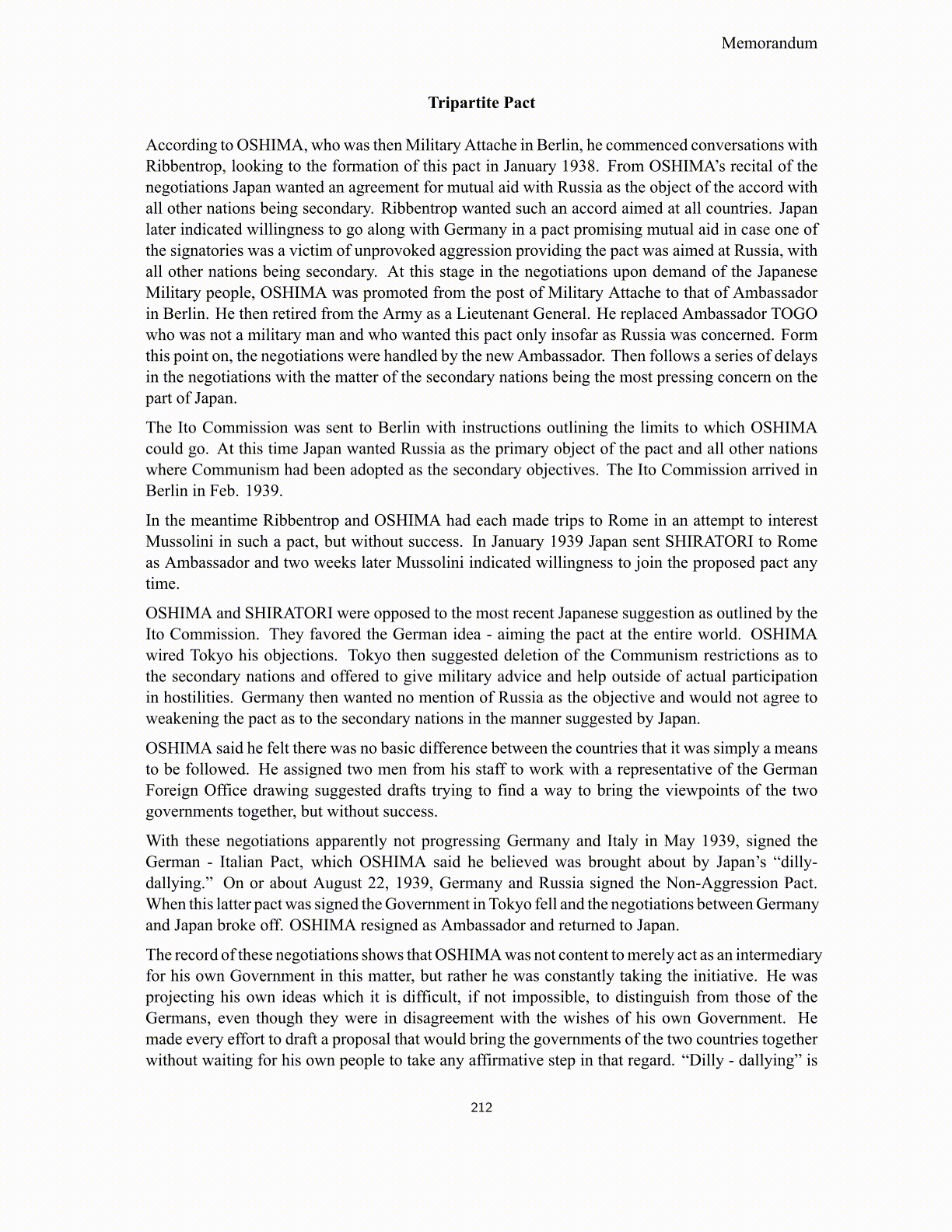
Memorandum Tripartite Pact According to OSHIMA, who was then Military Attache in Berlin, he commenced conversations with Ribbentrop, looking to the formation of this pact in January 1938. From OSHIMA’s recital of the negotiations Japan wanted an agreement for mutual aid with Russia as the object of the accord with all other nations being secondary. Ribbentrop wanted such an accord aimed at all countries. Japan later indicated willingness to go along with Germany in a pact promising mutual aid in case one of the signatories was a victim of unprovoked aggression providing the pact was aimed at Russia, with all other nations being secondary. At this stage in the negotiations upon demand of the Japanese Military people, OSHIMA was promoted from the post of Military Attache to that of Ambassador in Berlin. He then retired from the Army as a Lieutenant General. He replaced Ambassador TOGO who was not a military man and who wanted this pact only insofar as Russia was concerned. Form this point on, the negotiations were handled by the new Ambassador. Then follows a series of delays in the negotiations with the matter of the secondary nations being the most pressing concern on the part of Japan. The Ito Commission was sent to Berlin with instructions outlining the limits to which OSHIMA could go. At this time Japan wanted Russia as the primary object of the pact and all other nations where Communism had been adopted as the secondary objectives. The Ito Commission arrived in Berlin in Feb. 1939. In the meantime Ribbentrop and OSHIMA had each made trips to Rome in an attempt to interest Mussolini in such a pact, but without success. In January 1939 Japan sent SHIRATORI to Rome as Ambassador and two weeks later Mussolini indicated willingness to join the proposed pact any time. OSHIMA and SHIRATORI were opposed to the most recent Japanese suggestion as outlined by the Ito Commission. They favored the German idea - aiming the pact at the entire world. OSHIMA wired Tokyo his objections. Tokyo then suggested deletion of the Communism restrictions as to the secondary nations and offered to give military advice and help outside of actual participation in hostilities. Germany then wanted no mention of Russia as the objective and would not agree to weakening the pact as to the secondary nations in the manner suggested by Japan. OSHIMA said he felt there was no basic difference between the countries that it was simply a means to be followed. He assigned two men from his staff to work with a representative of the German Foreign Office drawing suggested drafts trying to find a way to bring the viewpoints of the two governments together, but without success. With these negotiations apparently not progressing Germany and Italy in May 1939, signed the German - Italian Pact, which OSHIMA said he believed was brought about by Japan’s “dilly- dallying.” On or about August 22, 1939, Germany and Russia signed the Non-Aggression Pact. When this latter pact was signed the Government in Tokyo fell and the negotiations between Germany and Japan broke off. OSHIMA resigned as Ambassador and returned to Japan. The record of these negotiations shows that OSHIMA was not content to merely act as an intermediary for his own Government in this matter, but rather he was constantly taking the initiative. He was projecting his own ideas which it is difficult, if not impossible, to distinguish from those of the Germans, even though they were in disagreement with the wishes of his own Government. He made every effort to draft a proposal that would bring the governments of the two countries together without waiting for his own people to take any affirmative step in that regard. “Dilly - dallying” is 212